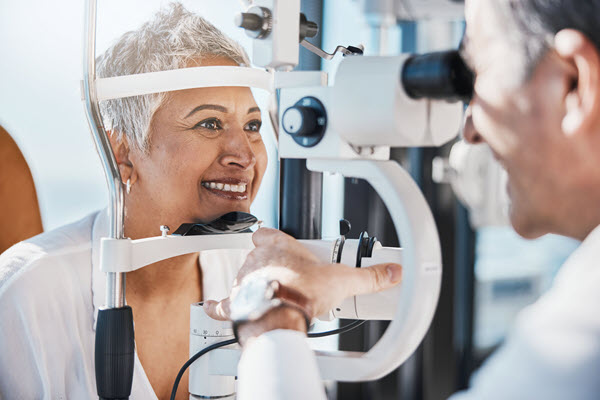A comprehensive eye exam is essential for maintaining healthy vision and detecting potential eye conditions early. At Eye Care Specialists of Michigan, our experienced eye doctors use the latest diagnostic equipment to assess your overall eye health, screen for cataracts, glaucoma, macular degeneration, and other common eye diseases, and ensure your prescription is up-to-date.
Regular eye exams can help protect your vision and detect underlying health issues, such as diabetic retinopathy, that may affect your sight. Whether you’re experiencing vision changes or it’s time for your routine check-up, our team is here to provide the personalized care your eyes deserve.

Did You Know?
A comprehensive eye exam can detect more than just vision problems—your eyes can reveal early signs of serious health conditions like high blood pressure, diabetes, and even certain types of cancer. Your eyes truly are a window to your overall health!
What’s Included in Our Eye Exams
Medical History Review
Your eye doctor will ask about your medical history, including any vision problems you’ve had, medications you take, and your family’s eye health history.
Visual Acuity Test
This is the part where you read letters from a chart (Snellen chart) to measure how clearly you can see at different distances, determining your prescription if needed.
Refraction Test
The doctor will use a phoropter (the device with various lenses) to determine your exact eyeglass or contact lens prescription by asking which lenses make your vision clearer.
Eye Muscle Test
Your eye doctor will check how well your eye muscles move and function by asking you to follow a moving object, like a pen or light, with your eyes.
Pupil Dilation
Drops may be used to dilate (widen) your pupils so the doctor can get a better view of your retina and optic nerve to check for signs of disease such as macular degeneration or diabetic retinopathy.
Slit-Lamp Exam
This exam involves a microscope that shines a thin beam of light into your eye, allowing the doctor to closely examine the structures at the front of your eye, such as your cornea, iris, and lens, for any abnormalities.
Intraocular Pressure Test (Tonometry)
This test, often associated with the “puff of air,” measures the pressure inside your eye to screen for glaucoma, a disease that can damage the optic nerve.
Retinal Exam (Ophthalmoscopy)
Your eye doctor will use an ophthalmoscope to examine your retina, optic disc, and blood vessels for any abnormalities, which is crucial for identifying conditions like cataracts, glaucoma, and macular degeneration.
Color Vision Testing
If necessary, this test checks your ability to distinguish colors, which may indicate certain types of color blindness or eye health issues.
